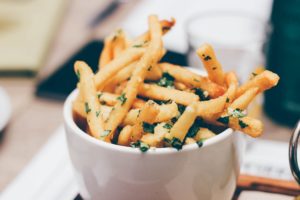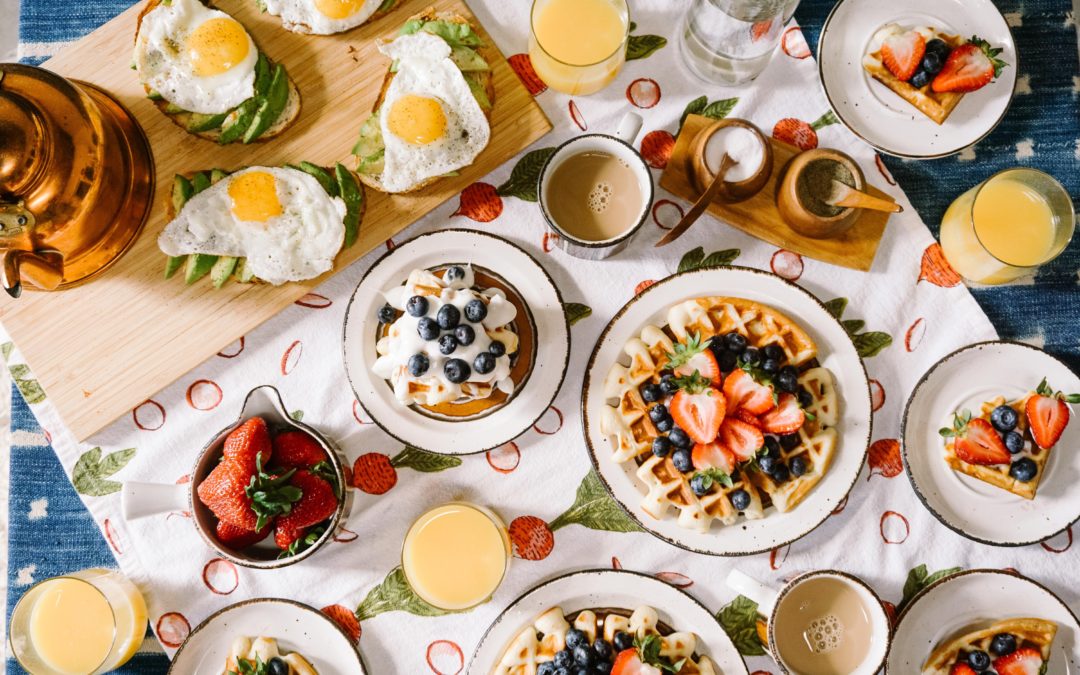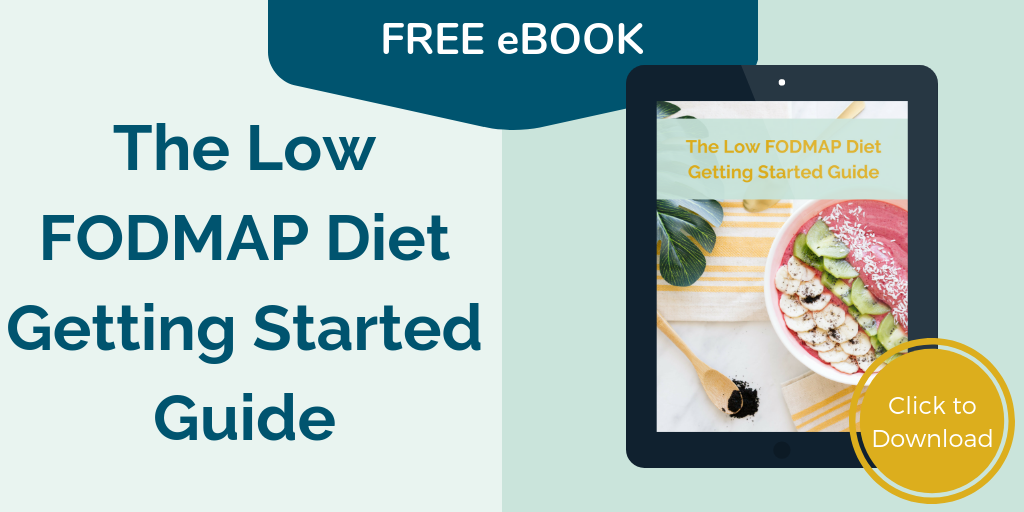Binge Eating with IBS
How to Handle Food Cravings When You Have Irritable Bowel Syndrome
Relief Report 023: Are you IBS Binge Eating?To get clear on your Triggers, download our checklist here https://stephanieclairmont.com/triggerchecklist
Posted by Stephanie Clairmont, RD on Wednesday, January 3, 2018
We all do it – that afternoon snack attack when we get home after a long day. Once we’ve wrapped up whatever was keeping us busy all day, we often start to get the pre-dinner munchies. You know around 4-5pm every day when we start to crave a little something to eat. You might also be well aware that giving in to your craving for a little something can quickly spiral out of control, and before you know it, you’ve eaten so much that you’re not even hungry once dinner finally gets on the table an hour later. I hate to be the one to tell you, but this habit is not always the best thing for us, especially when a lot of the foods we may choose to snack on could trigger our Irritable Bowel Syndrome symptoms. So how do we handle this binge eating with IBS?
Now, just because you might engage in some binge eating with IBS, whether it be at a fancy dinner party or just because you are feeling overwhelmed after your stressful day, this does not mean you have an eating disorder. Eating disorders are more serious than going a little crazy with the snacking from time to time, or getting that feeling that you can’t stop eating once you start. Eating disorders are classified psychological disorders that must be diagnosed by a psychiatrist or other psychological specialist. Specifically, binge eating disorder often comes with compensatory behaviours, meaning people with this disorder will try to undo the consequences of their overeating. Some of these behaviours include taking medications to lessen the amount of food we absorb, only eating at certain times of day, exercising excessively, or through vomiting/purging.

Binge Eating with IBS: What Affects Our Food Choices?
There are many reasons why our eating patterns may change day to day or month to month. Relationship struggles, awkward social encounters, problems at work, stress, boredom, and more may account for some of these reasons. We have many influences in our lives that may alter how we choose and what we choose to eat. What’s most important is that we are eating foods that we enjoy and that allow us to live symptom-free. Just because others are choosing one type of food or diet, doesn’t mean you have to follow. For example, if your friend orders the truffle fries, it may not be best for you to dive in and indulge their offer to share if fatty foods don’t work for you, since they can often trigger IBS symptoms. All our bodies react differently to foods depending on so many different factors!
Another way our food choices are influenced is by the time and environment in which we consume it. Whether it be movies and popcorn, a hot drink by the fire, or candy on a late night sleepover, all of these experiences influence our cravings and what types of food we want to eat during certain activities. Our response to being exposed to different environments becomes almost routine, which triggers the body to crave certain foods more so than other foods.
One of the major issues with our afternoon binge is the fact that our bodies are used to routine. Part of the reason we may binge eat is because we can experience feelings of pleasure due to a release of hormones (chemicals in the body) that tell our body we are happy and satisfied. This can become a problem because if we get into the routine of binging after a long day, since our body will adapt and release chemicals that tell us we are hungry and should eat to get the pleasurable effects. Eventually this will lead us to eat even when we are not hungry, which can lead to chronic overeating and weight gain. This overeating may also make IBS symptoms worse and make it harder to stick to the foods and portion sizes we know are best for our digestion.

Mindful Eating with IBS
Our bodies are great at telling us when we are hungry, so if we pay attention, we can know when we are eating because we are low on energy and experiencing true biological hunger, and when we are eating for other reasons. If you are hungry your body will generally start by telling you through a rumbling or growling stomach. In later stages you may start to feel light headed, shaky, or nauseous. These are all physical signs of hunger – our body’s way of telling us to eat!
On the other hand, if you aren’t hungry your body is also good at telling you this. This could be after a meal when you body is satisfied and doesn’t need anymore food, or it could be during a meal when your body tells you it’s full and has had enough. When we are full or satisfied, we generally feel energized, and our stomachs might feel a little bloated or tight. We also tend to feel more clear headed because our body has the right amount of fuel to function properly.
Why You Should Avoid Binge Eating with IBS
One reason you want to get a handle on those IBS cravings and binging is because this type of eating behaviour does not respect our body’s hunger and fullness cues. When we are fully tuned in and listening to these cues, we don’t need to put any sort of restriction on how much we think we should eat. Instead we can rely on our bodies to tell us when and how much we need to eat. Extreme feelings of hunger and strong cravings are often a result of restricting or depriving ourselves of the foods we enjoy and that provide us with the energy we need. Eating a light breakfast and lunch by deciding in advance to limit your portion based on what you think you should eat may set you up for a binge later on in the day. If your body did not get enough energy from your breakfast and lunch, your hunger will not have been satisfied, and your body will tell you to make up for it later in the day.
When you are on an elimination diet such as the low FODMAP diet, it’s not always possible to fully honour your taste preferences when you are hungry because depending on your triggers, some of your favourite foods may cause your symptoms to worsen. However, it’s still possible to rely on your body to tell you when and how much to eat while realizing and appreciating that eating according to your individual triggers will make you feel better. This is still a great way of respecting your body!
As you become a more mindful eater through identifying your triggers, you will become more aware of your body and your symptoms. This increased awareness may also result in you being more in tune with your hunger and fullness, respecting your body, and being able to trust it to tell you what it needs.
Portion sizes are also important on the low FODMAP diet, but this doesn’t mean you need to limit your overall intake. Portion sizes are used to understand how much of a FODMAP we can tolerate at a time. If you need to keep a portion size of a certain food small to avoid symptoms, you can always add energy to your meal by adding another safe food until your body feels satisfied. Remember, restricting will only lead to binging later, so do your best to make sure you are truly satisfied after every meal!
Wondering what else affects symptoms of IBS like gas, bloating, abdominal pain, diarrhea or constipation? You’ve got to understand more about the FODMAPs, poorly digested sugars that are the most common triggers in digestive issues. Download my free eBook – Click here to get a copy emailed to you right away.
How to Avoid Binge Eating with IBS
One of the reasons we may get this afternoon snack attack is because of the type of foods we eat. Some foods, like many sugars and carbohydrate-rich foods, only last a short time in our digestive system since they are quickly and easily absorbed. When foods are digested quickly, it leaves us feeling hungry again soon after we eat. Proteins, fats, and high fiber foods are harder for us to break down so they generally keep us full for longer. If you find you are starving at lunch and then starving again once you get home, it is most likely the type of food you are eating (or not eating).
Ideally, what you eat at a given meal should keep you satisfied for at least 3 hours. Consuming slower digesting foods such as fats, protein, and fibre in addition to those carbohydrate foods can help us keep full for longer. If having toast for breakfast and a green salad for lunch is part of your normal routine, try adding an egg to breakfast or some chicken to your salad to boost the protein and staying power of your meal. This will also help prevent that feeling of extreme hunger while you’re on your way home.
When it comes to fiber, adding soluble fibre is a great way to keep foods in our system for longer so we feel satisfied for longer. Oatmeal, oranges, flax seeds, chia seeds, or a half cup of canned lentils are all great sources of soluble fibre that are digestive friendly too 😉

How To Beat Binge Eating and Better Manage Your IBS Symptoms
Now that we know why we should try our best to avoid binge eating, it’s time for some strategies to help us stop this behaviour and form better habits.
- Walk around the kitchen while you cook. This will help you keep your mind off the food you are cooking so you are less tempted to dive in prematurely.
- If you’re hungry, have a healthy snack right before you start cooking dinner. This can include a little bit of protein, fat, and carbohydrate such as some cheese, nuts or seeds, fruit, or veggie sticks, or anything that doesn’t trigger your symptoms.
- Have a conversation when cooking. Like walking around, this helps to keep your mind off what you are cooking so you are less likely to run to the chip drawer and grab an unhealthy, potentially symptom-inducing, snack.
- Practice some deep breathing techniques. Like sleep, deep breathing helps us relax and listen to our bodies natural cues better. When we practice deep breathing, whether it be before meal time, at bed, or first thing when we wake up, it allows us to better hear and understand what our bodies are trying to tell us.
- Do some simple exercises (such as jumping jacks, or yoga poses, or squats) while you let things cook. This helps distract our minds from the food we are cooking, prevents us from grabbing a snack, and is a good way to trigger some hunger cues that will make dinner seem even more enticing.
- Play some music or read while you wait for your dinner to be cooked. You want to avoid watching television because this is often a trigger for our hunger cues. We often associated sitting down on the couch with snacks, and seeing others eat (whether it be on TV or in real life) can also cause us to want to eat as well!
At the end of the day, what we eat, when we eat, and how much we eat should be dependent on our own unique needs, preferences, and digestive triggers. We all need different amounts of food and we all react to different food and environmental triggers. It is important that we understand the best way to give our bodies exactly what they need to help us feel our best. Our bodies rock at telling us what we need, don’t you think it’s time we start listening?
I say we should make this year all about better understanding our bodies and tuning in with ourselves. What do you think, are you with me? This can mean many different things for many different people. If you struggle with IBS or you are constantly dealing with uncomfortable and embarrassing digestive symptoms, I’d love to work with you in the CLAIRITY program where we help people identify their triggers by getting to know their individual levels of tolerance for different foods. It’s not a one-size-fits all approach, you need a customized plan for YOU, and that’s just what you’ll get.
Wishing you much love & wellness,
Stephanie


